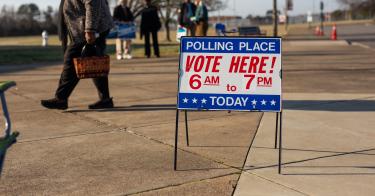Virginia has trailed other states in adopting robust education choice policies. But after the results of last week’s GOP primaries in the commonwealth, that could change.
The Virginia General Assembly is nearly evenly divided, with Democrats holding a slight majority in the state Senate (22-18) and Republicans holding a slight majority in the House of Delegates (50-46, with four vacancies).
However, although Virginia is where the GOP first embraced the label of the “Parents’ Party,” not all Republican state legislators in the Old Dominion support school choice. According to the American Federation for Children, only 16 state senators and 48 state delegates support school choice—at least for now.
Last week, candidates who favor school choice won seven of the eight races in which the Virginia Federation for Children PAC was involved. The state organization is affiliated with the American Federation for Children.
The one loss was where the federation-backed candidate took second place in an eight-way race for an open seat. Five of the federation-backed candidates will go onto competitive general election races for open seats.
According to the Virginia Public Access Project, the American Federation for Children Action Fund spent more than $302,000 in the primaries, making it the second-largest independent spending campaign in the Virginia primaries.
The federation’s fund spent more than the next 10 independent expenditure campaigns combined. Only Americans for Prosperity, a free-market group, invested more heavily in the Virginia primaries this year.
But it would be wrong to conclude that money alone won these races. The messaging by the American Federation for Children found a receptive audience among GOP primary voters, who increasingly have viewed school choice as a litmus-test issue.
In last year’s GOP primaries in Texas, even more voters supported a ballot proposition in favor of school choice (88%) than a pro-life one (83%). Similarly, a poll revealed that Republicans in Oklahoma expressed greater support for school choice (78%) than for pro-life policies (68%).
Last year, a national poll by RealClear Opinion Research found that 82% of Republicans supported school choice, up from 75% in 2020.
When GOP voters are informed that their state legislators are out of step with the base, they find new legislators. In states such as Arizona, Arkansas, Georgia, Idaho, Iowa, Nebraska, and Texas, where education became an election issue, Republican primary voters ousted incumbents seen as opposing school choice in favor of challengers in favor of school choice.
Nationwide, 85 of the 115 Republican primary candidates backed by the American Federation for Children and its affiliates won their primaries last year.
Democrats traditionally have had a significant advantage over Republicans on the issue of education, but as Nat Malkus explained in National Affairs, which party the voters trust on education is shifting rapidly:
Over the past three decades, Hart Research has conducted two dozen polls and found that Americans favored Democrats over Republicans on education issues by a minimum of six points; on average, the Democratic advantage was just under 14 points. But in March 2022, when Rasmussen asked 1,000 likely voters, “[w]hich party do you trust more to deal with education issues, Democrats or Republicans?” 43% reported that they trusted Republicans, compared to just 36% who favored Democrats.
Other polls confirm this finding: A June 2022 poll by Democrats for Education Reform found that 47% of voters in battleground districts trusted Republicans on education while 44% trusted Democrats. Another poll of voters in battleground states by the American Federation of Teachers revealed that 39% of voters trusted Republicans on the issue, giving them a one-point lead over Democrats. It seems that just as education’s salience with voters is rising, Democrats’ advantage is dissolving.
In Virginia’s last gubernatorial election, a quarter of voters listed education as the issue that mattered most. Of those voters, Republican Glenn Youngkin had a 53% to 47% advantage over his Democratic rival, former Gov. Terry McAuliffe.
It’s not hard to understand why Democrats are losing the support of parents. Parents want their children in schools where they are learning the basics of reading, writing, arithmetic, history, and science.
However, reading and math scores are plummeting as the teachers’ unions—a core constituency on the left—have embraced disastrous school closures, radical ideology in the classroom, pornographic books in school libraries, and policies that allow males into girls’ locker rooms and “socially transition” children behind their parents’ backs.
But when they’re not outright denying that learning loss exists, the teachers unions are making excuses for it.
“It’s OK that our babies may not have learned all their times tables,” Cecily Myart-Cruz, president of United Teachers Los Angeles, told Los Angeles magazine in August 2021. “They learned critical-thinking skills. They know the difference between a riot and a protest. They know the words insurrection and coup.”
Parents have other priorities. If traditional public schools won’t focus on providing a quality education, parents will find other schools that will.
And if politicians won’t support parents in making those choices, they’ll find other politicians too.
This piece originally appeared in The Daily Signal




